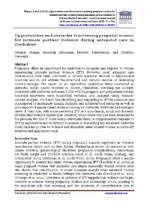Opportunities and obstacles to screening pregnant women for intimate partner violence during antenatal care in Zimbabwe
Date
2013Author
Shamu, Simukai
Abrahams, Naeemah
Temmerman, Marleen
Zarowsky, Christina
Metadata
Show full item recordAbstract
Pregnancy offers an opportunity for midwives to recognise and respond to women
experiencing intimate partner violence (IPV). However, most antenatal care
interventions have been conducted in private specialist services in high-income
countries and do not address the structural and cultural realities of developing country
settings. We report on an exploratory qualitative study conducted in antenatal public
health facilities in Harare, Zimbabwe, involving six in-depth interviews with midwives
and seven FGDs with 64 pregnant and postpartum women. Recorded interviews were
transcribed verbatim and analysed using thematic content analysis. We found that
identifying and responding to IPV in antenatal care is hampered by inadequate human,
financial and infrastructural resources as well as poor support of gender-based violence
training for midwives. Midwives had divergent views of their role, with some
perceiving IPV as a non-clinical, social and domestic problem that does not require their
attention, while others who had been sensitised to the problem felt that it could easily
overwhelm them. A comprehensive response to IPV by midwives would be difficult to
achieve in this setting but sensitised midwives could respond to cues to violence and
ultimately assist abused women in culturally sensitive and appropriate ways.

